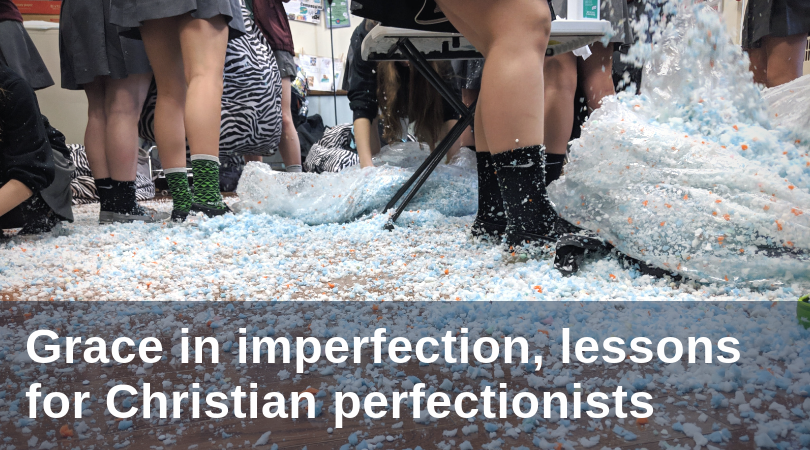
As a perfectionist, I often seek out God in the wrong places; I pursue perfection instead of holiness. I await his revelation in the flawless, impeccable, perfect moments. But my penchant for the ideal means that I often keep God sequestered to the sacred precincts of some faraway sanctuary instead of inviting him into the moments of my life when I most need him: the less-than-perfect moments. Recently, I learned a very messy lesson about the grace of God in the chaos of life when I accidentally unleashed a deluge of foam into the hallways of the Catholic high school where I teach.
The Foam-pocalypse
This year, I swapped out the typical student desks for zebra striped “Big Joe” bean bag chairs. However, as a novice bean bag chair handler, I was not prepared for how quickly the repeated, dramatic flops of teenage girls would abrade the tiny styrofoam ball filling into styrofoam pancakes. By the end of the first quarter, instead of upright chairs, my classroom was a zoo of 26 zebra-striped puddles. Determined to resurrect the chairs and restore the ambiance of my room, I ordered 100 pounds of shredded memory foam and formulated a plan to refill and refluff the chairs. In the single worst decision of my teaching career, I invited my students—freshmen girls—to be a part of that process.
Half-way through my first class period, I realized my mistake. Despite my students’ best efforts—and, oh, did they try—the shredded foam and tiny styrofoam beads went everywhere. They stuck to the floor, the ceiling, to socks, uniform skirts and kneecaps. As class period after class period of students traipsed into and out of my classroom, the foam spread across the building, multiplying at a rate not previously witnessed by humanity. I worked to contain the foam, but it was a futile effort and I was exhausted.
I had spent most of that semester chasing my own ego, wooed by perfection and the promise of being enough that seemingly lurked on the other side of prestige and position. Instead, the constant busyness left me feeling drained and empty. Now, the unfettered foam broadcast those deepest insecurities across the four floors of our building: failure, fake, good-for-nothing, stupid. I had little left to give my girls, but I had hoped and anticipated spending the day filling chairs would be a new start for us, a day full of teamwork, cooperation and learning. Instead, it very quickly became, a mess, literally. It was a catastrophe of foam, a foam-doom of cataclysmic proportions, a foam-pocalypse.
Yet, somehow, in spite of my own ineffectualness, by the end of the day my room was clean. Spotless. Foamless. (Okay, mostly foamless.) Perfect. The chairs were filled, wiped down and sorted into rows. The girls were happy and giggling as they picked hitchhiking foam out of each other’s hair. Grace tumbled through the foam-covered chaos of my room in baubles and trinkets of teenage glee.
Grace in imperfection, lessons for Christian perfectionists
The memories of the foam-pocalypse still make me cringe. Sometimes, small pieces of foam skitter across my floor unfettered, and I flinch. They are reminders of my massive failure, kryptonite to my perfectionism. But, despite signaling the outward collapse of my plans, those fugitive pieces of foam are grace filled reminders that call me out of the trap of perfectionism. As hard as failure is (and as embarrassing as the foam-pocalypse was), it taught me, a perfectionist, about the grace of imperfection.
God’s plan does not depend on perfection, but availability.
Our history as a Church tells the story of God consistently transforming the world through imperfect people and imperfect moments. Since the time our first parents left the Garden of Eden, God has called to himself the weak, the broken, the less-than-sterling. He is a God who moves toward the tumult of man, not to condone it, but to sanctify it, to use it to accomplish his mission. So far, in all of salvation history, no one, no sin, no mess has been able to thwart God’s plan. And that means even the messes I create are not enough to impede God’s mission. What a relief that my usefulness to God is not based on my perfection, but upon my willing availability to his in-breaking grace! Memories of our less-than-perfect ancestors in faith help me to recognize that when hope seems hidden, success seems unlikely and “good enough” is buried in piles of foam, God is still diligently at work. He is present to me, moving among the myriad of glitches I’ve produced in my life.
Strive for holiness, not perfection.
Thankfully, the foam-pocalypse quickly faded from my school’s collective memory, but so did the ultimate success of that day. As a perfectionist, I yearn for and count my worth based on the moments where I’ve achieved or met some goal. Those goals are usually arbitrary, established by the world as markers of greatness and success. In practice, they are short-lived and fleeting; the satisfaction lasting just long enough until I find there’s someone else who did it better, bigger, faster, stronger. The sickness of perfectionism is that it is ultimately unattainable. There is no terminus that measures perfection according to the world’s standards. But God doesn’t want that anyway. God wants me to strive for holiness, for unity of my heart and mind and will to his. It isn’t that the striving is wrong; that’s a part of being human. Striving toward desires and dreams is good and holy, but perfectionism turns those desires and dreams inward. They are ego-filled machinations of a self-obsessed soul. Instead, holiness asks me to consider what God wills and teaches me to yearn for God himself. Holiness doesn’t ask that I stop moving forward, but it does ask that I move forward toward lasting perfection.
Our imperfections reveal the power of God.
The ultimate success of my classroom that day did not come from my own power, but from God. In the midst of the mess (when I have exhausted my store of ability and expertise) is precisely when I begin to glorify God by turning to him for help. My imperfection and failure on the day of the foam-pocalypse and every day reveal something about God: in all things, God works for our good (Romans 8:18-28). God once buried himself in the interminable woe of human chaos and rose from it in perfect glory. When I allow God to enter into my mess, he does the same for me. He brings harmony from the debris and wreckage of my life; he knits together the disparate parts that I’ve tried to keep hidden. When I claim my failures and bear witness to my imperfections, I do so not to boast in them, but to demonstrate that the power of God works within and above my failures to accomplish his mission.
Be grateful.
My perfectionist ego is built from the stones of discontent; it is full of fissures and cracks, shaky and unstable. One errant word, one minor situation, one stray piece of foam is all it takes for me to collapse in a heap of despair and shame. The surest way I have found to defeat the ugliness of perfectionism and rampant discontent is simply to be grateful. Gratefulness asks me to see and believe that everything I am is a gift from God. Gratefulness asks me to consider, even in the middle of a mess, that every student, every moment, every breath, and yes, every piece of foam, is the gracious outpouring of God’s love. Gratefulness shakes me out of the morbid introspection of my soul for the areas that are not-good-enough and offers me the opportunity to see God in the tiniest tendrils of a world he created for his pleasure.
I am a Saint-in-the-making. My failures and foibles—the scars of my less-than-perfect existence, my lesson plans that go astray, the foam that encases my entire school—are sacred relics of my hallowed and hesitating journey home toward God. Each holy piece of failure is a story of God’s grace intervening in our world. It is a gift, a treasured reminder that as imperfect as I am, I belong to a perfect God.


